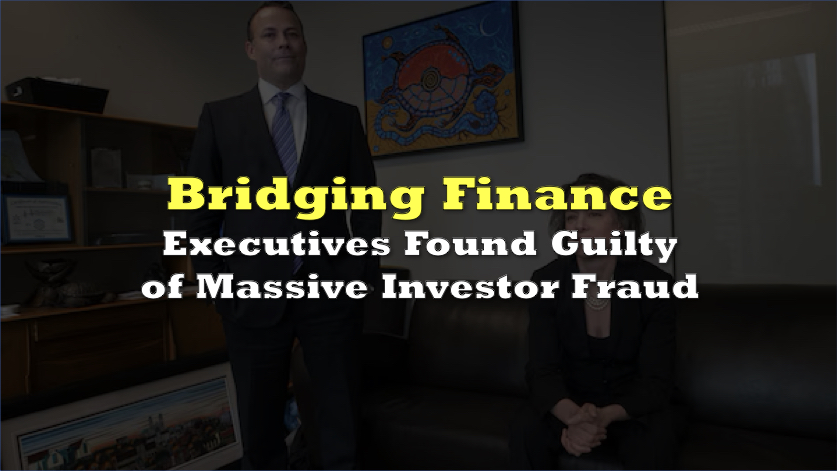The Ontario Capital Markets Tribunal has ruled that David and Natasha Sharpe, the husband-and-wife team behind Bridging Finance Inc., committed fraud by channeling investor money into personal benefits and undeclared kickbacks. This verdict arrives two years after Bridging Finance’s collapse, which had left thousands of Canadian investors at a collective loss of over $1 billion.
The ruling marks one of the most high-profile financial fraud cases in Canada, underscoring ongoing concerns about regulatory oversight and ethical standards in the alternative finance sector.
In a scathing report released this week, the Ontario Capital Markets Tribunal—an independent division of the Ontario Securities Commission (OSC)—found that David Sharpe, former CEO of Bridging Finance, and his wife, Natasha Sharpe, who held various executive roles within the company, funneled investor funds toward personal benefits. The Tribunal revealed that the couple received “undisclosed kickbacks” from borrowers to whom they had approved risky, high-interest loans on behalf of Bridging Finance.
Bridging, which managed over $2 billion for investors, has since been under court-ordered receivership, with its remaining assets administered by PricewaterhouseCoopers LLP (PwC).
PwC, appointed as the receiver in April 2021 following the OSC’s investigation, has estimated investor losses at $1.3 billion—almost two-thirds of the total assets Bridging Finance managed. According to PwC, these losses stemmed from Bridging’s unchecked loans to high-risk borrowers who often struggled to repay, an issue exacerbated by the Sharpes’ practices, which included the acceptance of personal kickbacks and lenient loan terms.
Founded in 2012, Bridging Finance was well-known within the Canadian finance sector for its unique model of providing short-term, high-interest loans to small and mid-sized businesses considered too risky by traditional banks. At its height, the company held $2.09 billion in assets from more than 26,000 investors, who were attracted by Bridging’s promise of high returns amidst a low interest rate environment.
However, the company’s operations unraveled as questions emerged regarding its loan approval process and repayment structures. By early 2021, the OSC had begun a formal investigation, prompted by allegations of financial mismanagement. Evidence mounted that Bridging executives had not only violated financial standards but had also leveraged investor funds to serve personal interests, significantly undercutting the value of the company’s loan portfolio.
Bridging’s decision to allow borrowers to pay in non-cash forms—such as company equity or accrued interest rather than cash—also compounded the firm’s financial instability.
Key Findings and Future Sanctions
In the Tribunal’s findings, the Sharpes were determined to have acted in “bad faith” by using Bridging Finance’s funds to secure benefits for themselves without disclosing these actions to investors. Andrew Mushore, Bridging’s former Chief Compliance Officer, was also found to have “indirectly participated” in the scheme.
The Tribunal criticized the executives’ blatant disregard for investor interests, highlighting the severe impact of their actions on the company’s 26,000 investors, many of whom were retail investors and pensioners seeking stable returns.
A hearing to determine the sanctions and potential penalties for the Sharpes and Mushore is scheduled for December 6. This could result in monetary fines, bans from future involvement in capital markets, and possibly even criminal charges, though legal experts suggest the Tribunal’s focus will likely remain on monetary penalties and disqualification from the securities industry.
The case has drawn attention to Canada’s regulatory landscape, with critics arguing that existing systems lack the transparency and accountability needed to protect investors adequately. Financial analyst and The Deep Dive contributor, Braden Maccke covered the Bridging Finance scandal extensively and he argues that the Bridging case points to a need for tighter regulatory measures in Canada’s private debt sector.
In his analysis on The Deep Dive, Maccke noted that Bridging’s financial practices, such as accepting non-cash loan payments and allowing unpaid interest to accrue without collateral, point to deeper regulatory weaknesses that allowed high-risk lending to persist largely unchecked. He argues that without tighter scrutiny in Canada’s private lending sector, these high-risk practices could continue to jeopardize investors, particularly in alternative finance markets like those Bridging operated in.
In his series on Bridging, Maccke has pointed to specific lapses, such as Bridging’s substantial loans to cannabis company MJardin and the lack of enforced transparency around these high-risk loans. This scandal, according to him, highlights a need for reform, with calls for clear regulatory updates to prevent similar mismanagement and losses for investors in the future.
Concerns about regulatory oversight have also been raised in Parliament, with some lawmakers calling for a review of Canada’s regulations around non-bank financial institutions.
For Bridging Finance’s investors, many of whom were drawn in by assurances of secure returns, the Tribunal’s decision brings some closure but little financial relief. With over a billion dollars lost, PwC’s receivership efforts are ongoing, yet the recovery of funds appears limited.
PwC’s last report estimated that a significant portion of Bridging’s loans—approximately $1.7 billion of the $1.9 billion outstanding—are accruing interest only on paper and are unlikely to return any real value.
Information for this story was found via The Globe And Mail and the sources mentioned. The author has no securities or affiliations related to this organization. Views expressed within are solely that of the author. Not a recommendation to buy or sell. Always do additional research and consult a professional before purchasing a security. The author holds no licenses.












